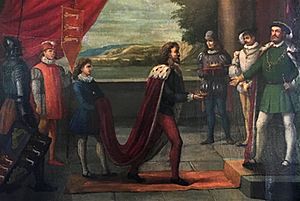Murrough O'Brien, 1st Earl of Thomond facts for kids
Quick facts for kids Murrough O'Brien |
|
|---|---|

Murrough surrenders the crown of Thomond to King Henry VIII at Greenwich upon the Thames July 1543.
|
|
| King of Thomond | |
| Reign | 1540-1543 |
| Predecessor | Conor O'Brien |
| Successor | Monarchy abolished |
| Earl of Thomond | |
| Reign | 1 July 1543 – 7 November 1551 |
| Successor | Donough O'Brien |
| Baron of Inchiquin | |
| Reign | 1 July 1543 – 7 November 1551 |
| Successor | Dermod O'Brien |
| Born | Before 1486 |
| Died | 7 November 1551 |
| Spouse | Eleanor FitzGerald |
| Issue | Turlogh O'Brien (died 1542) Dermod O'Brien Teige Mac Murrough O'Brien Donough O'Brien |
| House | Ua Briain |
| Father | Toirdhealbhach Donn Ó Briain |
| Mother | Raghnait MacNamara |
Murrough O'Brien (Irish: Murchadh Carrach Ó Briain) (died 7 November 1551) was an important Irish leader. He was the last King of Thomond, a kingdom in Ireland. Murrough was also a descendant of Brian Boru, a famous High King of Ireland. Later, he became the 1st Earl of Thomond.
Contents
Murrough O'Brien's Life Story
Murrough O'Brien was a direct descendant of Brian Boru, a powerful High King of Ireland. He was one of the sons of Toirdhealbhach Donn Ó Briain and Raghnailt MacNamara. In 1539, his brother, Conor O'Brien, passed away. Murrough then became the leader of Thomond. This happened through an old Irish custom called tanistry. Tanistry meant the next leader was chosen from the family, not necessarily the eldest son.
Early Challenges and Loyalty
Conor had tried to make his own children the next leaders. This caused some arguments between the brothers. Murrough joined other Irish lords to go against the English government. However, their plans were stopped by Sir William Brereton.
Soon after, Sir Anthony St Leger arrived as the new viceroy, or governor, of Ireland. Murrough wanted to talk with him about peace.
Meeting with English Leaders
In early 1541, Murrough met with the lord-deputy in Limerick City. They discussed terms for peace and for Murrough to submit to English rule. These terms would limit Murrough's power to the west of the River Shannon. They also had other rules for his family and followers. Murrough asked for time to think about these terms.
He agreed to recognize Henry VIII as his king. He also agreed to stop following the Pope's authority. Murrough was part of the Parliament of Ireland that made Henry the King of Ireland that year.
A New Path for Thomond
The Parliament moved to Limerick in February 1542. Murrough went there. Another Irish leader, Con O'Neill, had recently submitted to Henry VIII. This greatly influenced Murrough. He agreed to limit his power to the west of the Shannon. He also promised to be a loyal servant to King Henry.
St Leger thought Murrough seemed like a "very sober man" who would stay loyal. King Henry was pleased with Murrough's submission. He decided to give Murrough an important title. He also planned to give him land from religious houses that had been closed down.
Becoming an Earl and Baron
There was a challenge in how to pass on leadership. Irish custom (tanistry) was different from English custom (primogeniture), where the eldest son inherits everything. They found a clever solution. Murrough would become the Earl of Thomond for his lifetime. After he died, the title would go to his nephew, Donough, not his eldest son. Murrough's eldest son was made Baron Inchiquin. Donough was also made Baron Ibrickan at the same time.
This plan showed King Henry wanted to make peace in Ireland. He hoped that over time, Irish and English laws would work together. In June 1542, Murrough and his nephew Donough went to Trim for Parliament. They were well-dressed and had many people with them. They then went to Dublin with the lord-deputy.
Murrough asked to be part of the group that closed down religious houses in Thomond. The next year, he visited England. St Leger lent him money for his trip because money was scarce in Ireland.
Trip to England and New Titles
Murrough arrived at King Henry's court in June 1543. He was with Ulic de Burgh, 1st earl of Clanricarde. Murrough again promised his loyalty to the King. On Sunday, 1 July, he was officially made the Earl of Thomond. King Henry paid for the costs of this ceremony. He also gave Murrough a house and land in Dublin. This was so Murrough would have a place to stay when he attended Parliament.
Later Life and Legacy
After a short time in London, Murrough returned to Ireland. The honors he received had good results. He sometimes had disagreements with his neighbors, the Burkes and the Munster Geraldines. These arguments sometimes threatened the peace. However, Murrough respected St Leger. A word from St Leger was usually enough to calm him down.
Murrough went with St Leger to the water's edge when St Leger left in April 1546. He was also one of the people who welcomed St Leger back in 1550. Murrough O'Brien passed away the following year, in 1551. His nephew, Donough, became the next Earl of Thomond.
Murrough's Family
Murrough O'Brien married Eleanor FitzGerald. She was the daughter of Thomas FitzGerald, the Knight of the Valley. They had three sons and four daughters.
- Toirdhealbhach O'Brien (died 1542): He was known as a skilled and famous man for his age.
- Dermod O'Brien, 2nd Baron Inchiquin
- Teige Mac Murrough O'Brien
- Donough O'Brien
- A daughter named Slaine, who married her cousin, Sir Donnell O'Brien.
 | Tommie Smith |
 | Simone Manuel |
 | Shani Davis |
 | Simone Biles |
 | Alice Coachman |

